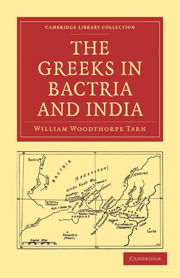Book contents
- Frontmatter
- Contents
- Prefaces
- Abbreviations
- Introduction
- PART I (INTRODUCTORY): THE BACKGROUND IN THE MIDDLE EAST
- PART II BACTRIA AND INDIA
- CONCLUSION
- Excursus. The Milindapañha and Pseudo-Aristeas
- Appendix 1 Monograms and find-spots
- Appendix 2 The names in -ηνη
- Appendix 3 Agathocles' pedigree coins
- Appendix 4 The Yuga-purāna of the Gārgī Samhitā
- Appendix 5 Demetrius in the Hāthigumphā inscription of Khāravela
- Appendix 6 Alexandria of the Caucasus and Kapisa
- Appendix 7 Antiochus IV and the temple of Nanaia
- Appendix 8 A sealing from Seleuceia
- Appendix 9 Ki-pin (Kophen) and ‘Arachosia’
- Appendix 10 Ta-yuan
- Appendix 11 Chorasmia
- Appendix 12 Ormuz: a lost kingdom
- Appendix 13 Σάγαλα ἡ καὶ Εὐθυμέδεια
- Appendix 14 The supposed Oxo-Caspian trade route
- Appendix 15 The Oxus question to-day
- Appendix 16 The Era of the Moga copperplate from Taxila
- Appendix 17 The Hermaeus-Kujula Kadphises coins
- Appendix 18 San and Rho
- Appendix 19 Pāndava-Pāndu and Pāndhya
- Appendix 20 The Chinese sources
- Appendix 21 The Greek names of the Tochari
- Addenda
- Addenda (1950) to the Second Edition
- General Index
- Index of Principal Greek and Latin Passages
- Plate section
Appendix 21 - The Greek names of the Tochari
Published online by Cambridge University Press: 10 November 2010
- Frontmatter
- Contents
- Prefaces
- Abbreviations
- Introduction
- PART I (INTRODUCTORY): THE BACKGROUND IN THE MIDDLE EAST
- PART II BACTRIA AND INDIA
- CONCLUSION
- Excursus. The Milindapañha and Pseudo-Aristeas
- Appendix 1 Monograms and find-spots
- Appendix 2 The names in -ηνη
- Appendix 3 Agathocles' pedigree coins
- Appendix 4 The Yuga-purāna of the Gārgī Samhitā
- Appendix 5 Demetrius in the Hāthigumphā inscription of Khāravela
- Appendix 6 Alexandria of the Caucasus and Kapisa
- Appendix 7 Antiochus IV and the temple of Nanaia
- Appendix 8 A sealing from Seleuceia
- Appendix 9 Ki-pin (Kophen) and ‘Arachosia’
- Appendix 10 Ta-yuan
- Appendix 11 Chorasmia
- Appendix 12 Ormuz: a lost kingdom
- Appendix 13 Σάγαλα ἡ καὶ Εὐθυμέδεια
- Appendix 14 The supposed Oxo-Caspian trade route
- Appendix 15 The Oxus question to-day
- Appendix 16 The Era of the Moga copperplate from Taxila
- Appendix 17 The Hermaeus-Kujula Kadphises coins
- Appendix 18 San and Rho
- Appendix 19 Pāndava-Pāndu and Pāndhya
- Appendix 20 The Chinese sources
- Appendix 21 The Greek names of the Tochari
- Addenda
- Addenda (1950) to the Second Edition
- General Index
- Index of Principal Greek and Latin Passages
- Plate section
Summary
It is claimed (p. 289) that the Tochari who invaded Bactria cannot have spoken Dialects A and/or B, because their name was aspirated and these dialects have no aspirate. It seems advisable therefore to collect and examine all the Greek forms of the name, as this has not been done, and the Greek forms are much earlier than most of the Oriental ones.
Apollodorus, c. 100 b.c., has Τόχαροι (Tocharoi); this form was popularised by Strabo and has passed into common use as this people's name. Ptolemy, vi, 11, 6, has this form in connection with Bactria,-and also, vi, 12, 4, a form Τόχαροι (Tachoroi), with metathesis of the vowels, in connection with Sogdiana. In this form the aspirate comes in the second syllable, not the first. This placing of the aspirate is also found in the Sanscrit Tukhāra, and again in the name of Bactria (in various languages) from the fourth to the eighth century a.d., Tocharistan (presumably taken from Τόχαροι), and in forms derived from Tocharistan, like tοχαrî (tοχαrî or tοχαrî) which is found later in Central Asian documents as the name of the Saca speech of the Kushans of Tocharistan (p. 290), and Hsüan Tsiang's Tu-ho-lo (Tuoχuâlâ, Bailey) in the seventh century a.d.
What form was used by the other Greek historian, ‘Trogus' source’, c. 85 b.c., can only be deduced, but certainly it was not Τόχαροι. The MSS of Trogus Prol. xlii give Thocarorum, Thodarorum, Thoclarorum, Toclarorum, to which the best MSS add, in Justin xlii, 2, 2, the form Thogariis.
- Type
- Chapter
- Information
- The Greeks in Bactria and India , pp. 515 - 519Publisher: Cambridge University PressPrint publication year: 2010First published in: 1938



